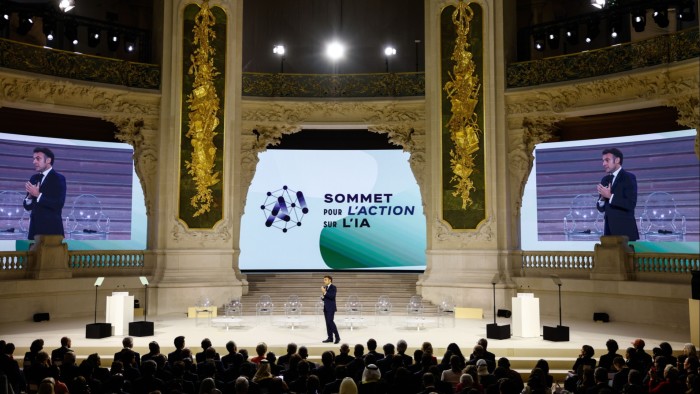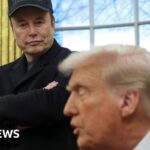Unlock the White House Watch newsletter for free
Your guide to what the 2024 US election means for Washington and the world
US vice-president JD Vance warned Europe not to adopt “overly precautionary” regulations on artificial intelligence as America and the UK refused to join dozens of other countries in signing a declaration to ensure that the technology was “safe, secure and trustworthy”.
The two countries held back from signing the communique agreed by about 60 states at the AI Action summit in Paris on Tuesday, dealing a setback to efforts led by French President Emmanuel Macron to build international consensus around the technology.
“The Trump administration will ensure that the most powerful AI systems are built in the US, with American-designed and manufactured chips,” Vance told an audience of world leaders and tech executives.
“America wants to partner with all of you . . . but to create that kind of trust, we need international regulatory regimes that foster the creation of AI technology rather than strangle it,” he added.
Signed by countries including China, India and Germany, the summit declaration calls for “ensuring AI is open, inclusive, transparent, ethical, safe, secure and trustworthy, taking into account international frameworks for all”.
While the commitments are non-binding, both the US and UK had signed similar declarations at previous iterations of the AI summit.
One person close to the British government suggested the wording was “too restrictive”.
A UK government spokesperson said that the declaration “didn’t provide enough practical clarity on global governance, nor sufficiently address harder questions around national security”.
An official from one of the countries that signed the document and was present for talks over the communique said that the US had been put off by language around multilateralism.
The declaration included “reinforcing international co-operation to promote co-ordination in international governance” as a priority.
The harder stance from the US comes as it races to maintain its advantage over China on AI-related developments, including chip manufacturing and chatbots.
The recent arrival of a new AI model from China’s DeepSeek, which produced high-level outputs at apparently much lower cost, shocked Silicon Valley groups such as OpenAI.

Europe is also seeking a foothold in AI to reduce its reliance on the US and China. At the two-day summit hosted by Macron, European leaders and companies unveiled about €200bn of planned investments in data centres and computing clusters.
European officials argued that the region could push ahead with AI investments while also putting in place guardrails against the technology’s risks.
“AI needs the confidence of people and has to be safe,” said European Commission president Ursula von der Leyen.
But Vance rejected the idea that caution was needed. “We believe that excessive regulation of the AI sector could kill a transformative industry just as it’s taking off,” he said.
Vance also warned the assembled leaders not to sign AI deals with “authoritarian regimes”, in a thinly veiled jab against China.
Senior figures in Trump’s orbit including Elon Musk have been highly critical of the former administration’s focus on “woke” concerns over AI safety, including bias and misinformation.
Vance’s speech was “a 180-degree turnaround from what we saw with the Biden administration”, said Keegan McBride, a lecturer at the Oxford Internet Institute, who studies the geopolitics of AI.
Frederike Kaltheuner, senior EU and global governance lead at the AI Now Institute, an AI research body, added that following the launch of DeepSeek, Europeans had fleetingly thought they had a chance to compete in AI.
“Vance just dumped water all over that. [It] was like, ‘Yeah, that’s cute. But guess what? You know you’re actually not the ones who are making the calls here. It’s us.’” said McBride.
Additional reporting by Anna Gross and Jim Pickard in London







